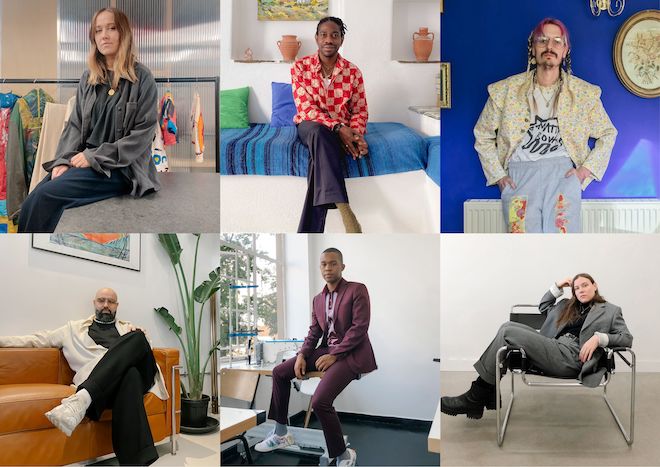
30.11.2020 | Blog , Culture , Fashion | BY: admin
Celebrating transparency and craftsmanship within the industry, the International Woolmark Prize 2021 nominees inspire hope for the future of fashion at time when innovation is needed more than ever.
This year’s theme, ‘Less is More’, focuses on slow, conscious and responsible design. Buzzwords these may be, but this year’s crop of design talent are showing how to put ambitious principles into action. The nominations brings together a group of bright young designers who have built innovative new models from the ground up.
Twin talks to Bethany Williams, Casablanca, Kenneth Ize, Lecavalier, Matty Bovan, Thebe Magugu about putting sustainability first and creating a green hype cycle.
Matty Bovan, United Kingdom
We have always tried to be sustainable, and to question where we source materials and artisan makers. We make everything in the United Kingdom and try and source as much as we can from the UK and even more locally, Yorkshire where we are based. We use deadstock fabrics, deadstock yarns, and end of line pieces alongside stock service fabrics. This is very important to myself, and my business, in a world where we have such huge amounts of materials and garments made every day – it’s important to rework and make something special.
I am very interested in upcycling, whether this be vintage pieces, or end of line, damaged fabrics; it excites me to be able to transform something under an artisan process. We rework all leftover fabric we have each season, alongside any excess yarns we have, nothing is ever disposed of and always reused in some way. Constantly experimenting with craft and process is very important to me and helps aid me in transforming materials that others may disregard. We use screenprinting in-house, embroidery and hand-dying to rework.
We are in a great place in fashion, with people asking more questions about who is making what we buy, who is putting love into these pieces. Traceability has always been very important to me, and I have always found it key to understand who we work with and where they are in the world. I try to work with artisans with hand skills. I try to make and treat a lot of textiles in-house. I like the touch of the hand on everything that comes under Matty Bovan.
mattybovan.com
Thebe Magugu, South Africa
If the current state of the world is enough to go on, I think it’s critical for anyone working in creative output of any kind to consider their sustainability practices. We are effectively destroying the world and sustainability is all our pledges to try to counter that destruction as much as possible.
I am very proud of the fact that most of our resources and production are made locally in South Africa. I am excited about the continuation of problem-solving through fashion, and the growing consciousness our industry is having towards its role in solving those problems. This is very particular to the younger generation especially.
thebemagugu.com
Lecavalier (Marei-Eve Lecavalier), Canada
As a young generation of creators, we were put in front of a reality that fashion production and consumption was creating a lot of waste. My creativity comes also from a place where I want to make special pieces by reusing discard materials, there is so much material available out there and it is our duty to find new ways to be creative with it. I’m really proud that I have created a unique technique to weave discard leather. There is still so much for us to explore in terms of new weaving technics but also to explore of different fabrics. I’m looking forward to an era where the craftsmanship and savoir-faire will become more present. Fashion has always been about the garment, it’s not only a product and it’s not only hype.
lecavalier.studio
Casablanca (Charaf Tajer), France
I think it’s important we all play a role in sustainable practices. The fact that we go from the idea to the creation of the garment is very special for me. My most proudest is that I am continuing the techniques of French classic fashion traditions. The whole process of creating the print and the fabrics. In terms of my own designs, I am optimistic about bringing more joy and gratitude through the clothing to people’s lives. I am optimistic that there is going to be more diversity and more acceptance towards people from different backgrounds. I think we have experienced a small part of the ongoing evolution that will create a better a future.
casablancaparis.com
Bethany Williams, United Kingdom
Growing up my mum has always been very socially and environmentally conscious, and very caring, so this has been something that has been of interest to me from a young age. I want to create beautiful things but I always want to create something with a purpose, something that can support and protect the maker and the supply chain it is a part of. Each item we produce is made from recycled, deadstock, or organic materials and made in the UK and Italy. I feel it’s really important to have produce locally or close to home so that you know exactly where your garments are made and who exactly is making them.
I think our most recent collection titled ‘All Our Children’ is what I’m most proud of. Not just because of the outcome of the final collection of garments but also the groups of creatives and like-minded people that worked on the project alongside me. I really like the network of amazing people we are building through each collection and how positive and supportive the network is that we are surrounded by and look to grow and add to this network each season.
I’m always really excited to develop my skills and look forward to introducing new techniques each season, alongside the research into and introduction of new social manufacturing partners. I hope to expand my knowledge of social manufacturing, supply chain, and craft, and strive to share this at every opportunity to help drive change within industry. I feel the presence of change starting to happen within the fashion industry, and I’m optimistic that this will continue and build momentum towards a more environmentally and socially conscious system, however there is a long way to go yet.
bethany-williams.com
Kenneth Ize, Nigeria
My love for the traditional Nigerian design textile culture of Aso Oke. Historically Aso Oke weaving created fabrics that were used to create everyday clothing that lasts for centuries and can be passed down from generation to generation. However, we started seeing less and less use of the textile except in occasion wear. With my brand I hope to bring the use of this textile to the forefront.
I’m also very passionate about the weaving villages we empower, and I hope to do all I can to continue to push opportunities for them to grow and develop
In a collaboration with Nigerian Product design firm nmbello Studio, we were able to redesign the loom. The old loom had never been redesigned or updated, the weavers had complained about the discomfort they felt while using it. By redesigning the loom we were able to birth new life into the industry as a new generation of weavers have come forward with an eagerness to learn and push Aso Oke weaving into a modern era.
I am most optimistic about the economic empowerment that is the bedrock of my atelier. We are currently building a factory to house many of our local artisans, creating more opportunities for local textile designers and establishing a more structured industry within Western Africa.
kennethize.net
Find out more about the International Woolmark Prize here.
Tags: Bethany Williams, ethical design, International Woolmark Prize 2021, Matty Bovan, Sustainable fashion, Thebe Magugu
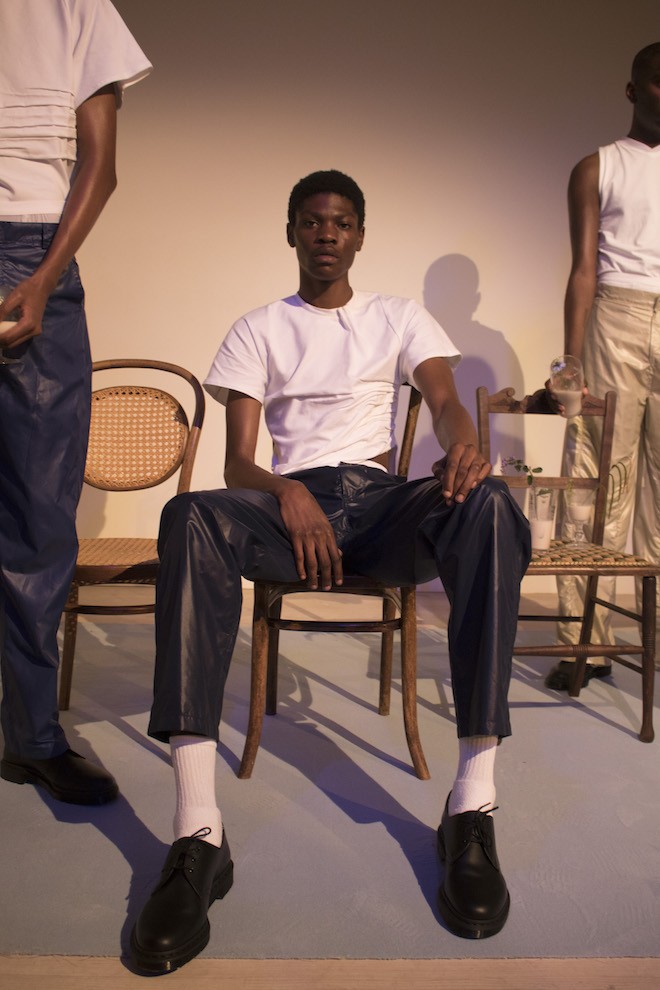
11.06.2018 | Blog , Fashion | BY: admin
This season women were behind the most impactful designs at London Fashion Week Men’s. Such a reputation isn’t new: a fresh generation of women designers have been reshaping the London menswear scene for some seasons. In offering a streetwear, high fashion hybrid that is both romantic and wearable these designers set a precedent for a different kind of maleness. And beyond the clothes, these women have rooted their designs in a sense of community. They offer new menswear tribes that discard archaic notions of masculinity and propose a more complex and engaging modern man. Twin spotlights on the women shaping the London menswear scene.
Bianca Saunders
Bianca Saunders SS19 had everybody talking. This season the designer focussed her attention around the theme ‘Gestures’, exploring poses and body language. Her clothes played with the idea of awkwardness in your own clothes, with in-built creases reflecting the process of wearing in and becoming familiar with your clothes. Using materials such as nylon and cotton the silhouettes were tight and intimate, the tension between the known and the awkward at play here too. This was no doubt a pivotal collection for Saunders but the success was expected too, given the hype the Kingston and Royal College of Art graduate has been garnering since she first showed at Graduate Fashion Week in 2015 . Her exploration of masculine identity, inspired by London and her West-Indian heritage, is necessary and relevant.

Bianca Saunders SS19
Martine Rose
Martine Rose has been revered for her menswear designs since she began in 2007. Her concise vision marries the power of streetwear and logo mania with expert tailoring, the result was to create an aesthetic based on the power of family and clan. There’s not one explicit Martine Rose look but instead a recognisable signature: exaggerated silhouettes, structured tailoring, perfectly off-kilter styling. The everyday twisted just enough to take you by surprise. The sense of community has also been fostered by Rose through the use of off-catwalk shows. These include a market in Tottenham and this season, a catwalk along a street in Camden, complete with overexcited neighbours taking pictures from their front yards. The result: a clear connection between fashion as a medium and fashion as the clothes that people wear in everyday life, without compromising on beauty, romance or vision.
Bethany Williams
Welsh designer Bethany Williams brings activism and community to the heart of her designs. Collections are based around a zero-waste approach, with sustainable fabrics created in collaboration with partners including Tesco and the San Patrignano drug rehabilitation community in Italy. She also works with TIH modelling agency, a platform which supports young people in London affected by homelessness. In short, her approach is near unparalleled in the London fashion industry – and she’s only just getting started. As Bethany told Twin: “It always starts with the charity or community that I am working with, then it goes to the waste materials that I want to use, then it goes to the fabric and then from the fabric I work out the form: it is initially inspired by the charity I choose to work with from the start.”
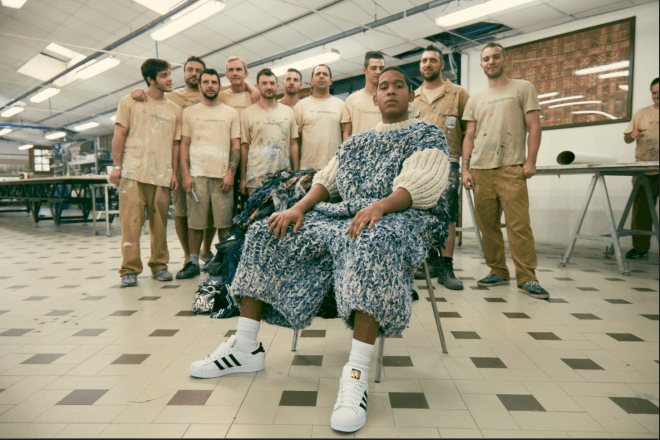
Bethany Williams
Grace Wales Bonner
Wales Bonner didn’t show at LFWM this season but her impact on the menswear scene is evident nonetheless. The winner of the 2016 LVMH Prize first made waves with her first collection “Afrique” in 2014 where she was awarded the L’Oréal Professional Talent Award. In this rapid rise to fashion’s heights, Wales Bonner’s vision has always been clear. Her collections draw inspiration both from contemporary life and works by writers such as James Baldwin, Ralph Ellison and Marlon Riggs. Her romantic, 70’s-esque silhouettes are richly rendered with beautiful use of fabric and colour. Her intimate and considered approach has also been reflected in her approach to shows, where historically the designer has opted for smaller, chair-less presentations, shown to perfect soundtracks and accompanied by reading lists to keep editors on their toes.
Astrid Andersen
Having graduated from the Royal College of Art in 2010, Astrid Andersen quickly rose through the fashion ranks. She was a member of Fashion East and was awarded NEWGEN sponsorship, developing her idiosyncratic signature that marries sportswear and luxury. In doing so Andersen set a dynamic precedent for menswear in which boundaries are blurred and style is freely interpreted.
Paria Farzaneh
A relatively new addition to the London menswear scene, Paria Farzaneh is a Yorkshire-born, London-based Iranian designer whose collections are inspired by her heritage. Designs offer a combination of Iranian materials and silhouettes threaded through contemporary London style. The result is streetwear printed with traditional patterns, t-shirts and polo shirts printed with ‘Iran’ and adorned with textiles as well as classic suit tailoring. Addressing mis-representation of the Middle East and specifically Iran in the West Farzaneh offers a modern and relevant vision for maleness. A distinct aesthetic which celebrates unique identity and fuses traditional lad culture with delicacy and ornate detail.
Tags: Astrid Andersen, Bethany Williams, Bianca Saunders, Grace Wales Bonner, LFWM, Martine Rose, SS19
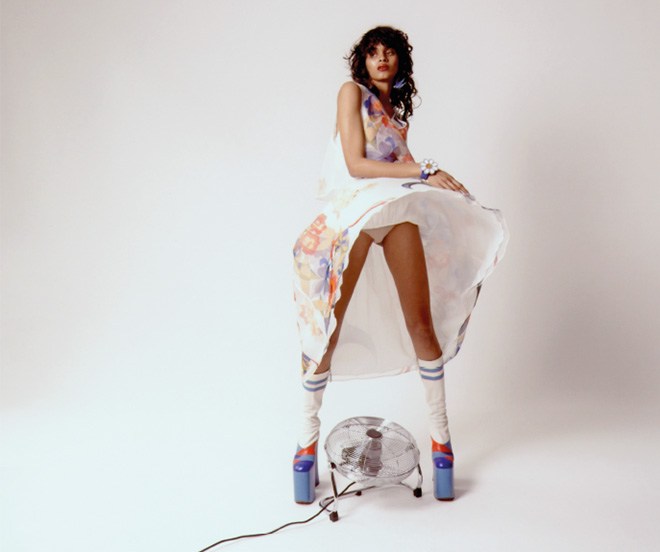
19.03.2018 | Blog , Twin Book | BY: admin
As we make our way through 2018, Twin delves into the complexities of female camaraderie through a low-key lens, as we study the closeness of sisterhood, as compiled by Holly Hay. Samuel Bradley also turns focus on girls with bows, as archery takes centre stage when accessorised with the latest collections. In the States, we meet Arrow De Wilde — daughter of rock photographer Autumn de Wilde — and the band she fronts, Starcrawler. Shot by Molly Matalon, this explosive group are as likely to shred expectations as riffs, as they spit fake blood on crowds and remind us all what music can, and potentially should, be about. Elsewhere, we take the drama to the ice as photographers Stevie and Mada give us incredible portraits of figure skating stars past, present and future, in catwalk attire to suit. The unimaginable power of pregnancy is also given the respect it deserves, thanks to Jesse J Jenkins and Aurelia Donaldson, in ‘The First Thing I Stole Was Your Milk’, and the important, and ethical, work of designer Bethany Williams is explored in ‘Cycle Of Exchange’. Lastly, we raise the barre on couture through the refined images of Agnes Lloyd-Platt, and find out what happened with Okay Kaya (Wilkins) almost met PJ Harvey. Join us for the ride.
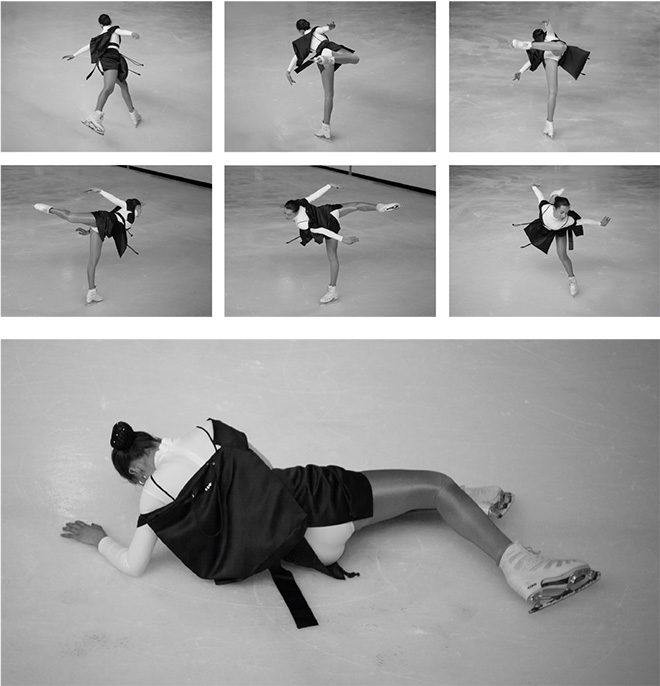
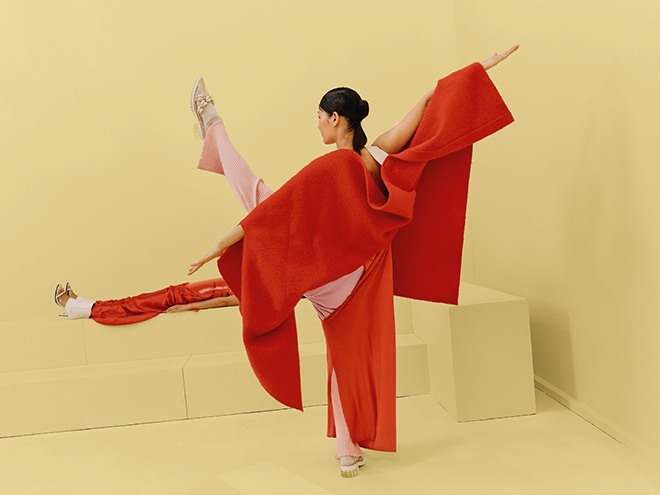
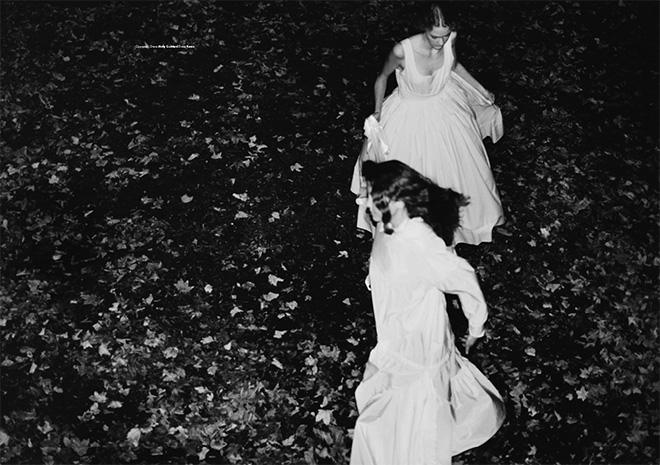

Tags: Agnes Lloyd-Platt, Arrow De Wilde, Aurelia Donaldson, Bethany Williams, Cycle Of Exchange, Holly Hay, Jesse J Jenkins, Molly Matalon, Okay Kaya, Samuel Bradle, Starcrawler, Stevie and Mada, The First Thing I Stole Was Your Milk
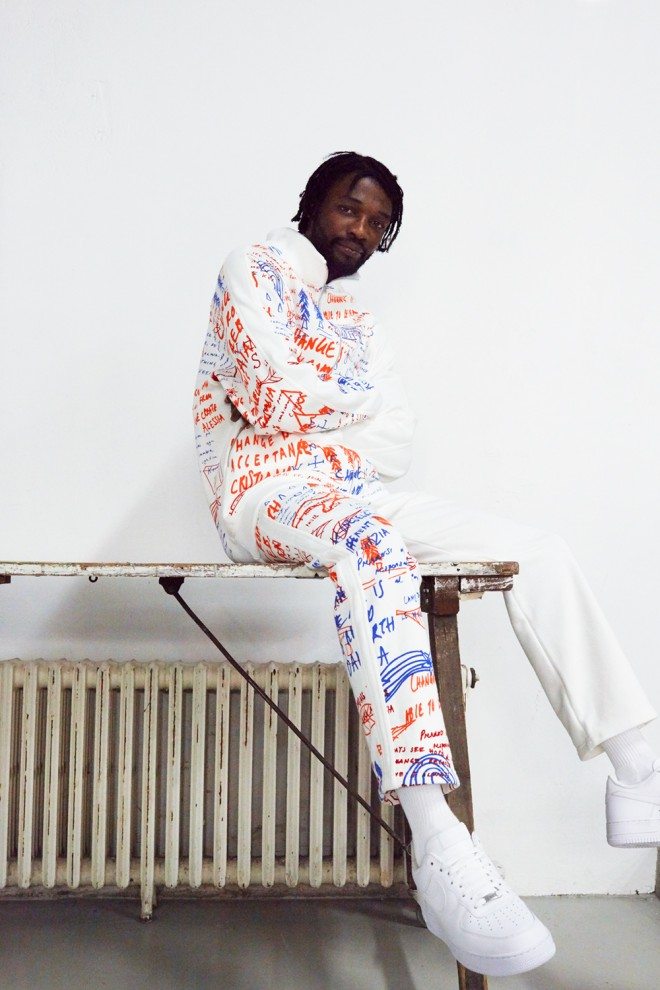
11.01.2018 | Culture , Fashion | BY: admin
When one thinks of Bethany Williams’ brand, it is not necessarily within the confines of fashion. Encompassing sociological issues, political arenas and cultural quarters, to talk about Bethany merely within the limitations of fashion would be doing the brand an injustice.
Having released her brand less than two years ago, Bethany Williams has been constructing menswear that is embedded within charities and communities, hoping to cause a real effect in the social space we engage with. Working with the charities San Patrignano and London College of Fashion, UAL’s Making for Change programme this season – two pioneering rehabilitative programmes which work closely with vulnerable women and supports their path to rehabilitation through equipping them with craftsmanship and manufacturing skills and qualifications – and the model agency TIH Models, a new modelling agency supporting youth in London affected by homelessness, Bethany’s points of reference and areas of focus lay a typically socially attuned and sustainably-led focus on her third collection to date.
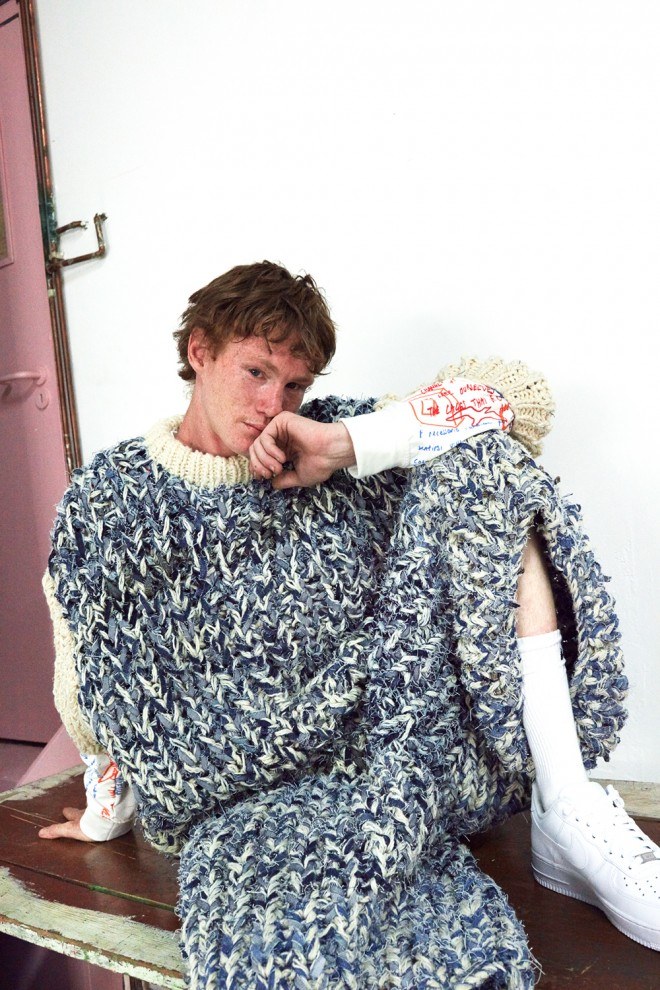
The menswear designer showcased at the DiscoveryLAB this London Fashion Week Men’s January 2018 through both a film created in collaboration with Crack Stevens entitled ‘Women of Change’ and the collection alongside, ‘Attenzione’.
The film is a poetic narrative that celebrates the strength of the communities of San Patrignano and Making for Change, and explores how fashion can incur social and environmental change.
Throughout the film, the theme of ‘second chances’ was explored, drawing parallels between the second chance given to the discarded materials from which Bethany created the fabrics at San Patrignano, and the second chance given to the women involved in both of these innovative programmes.
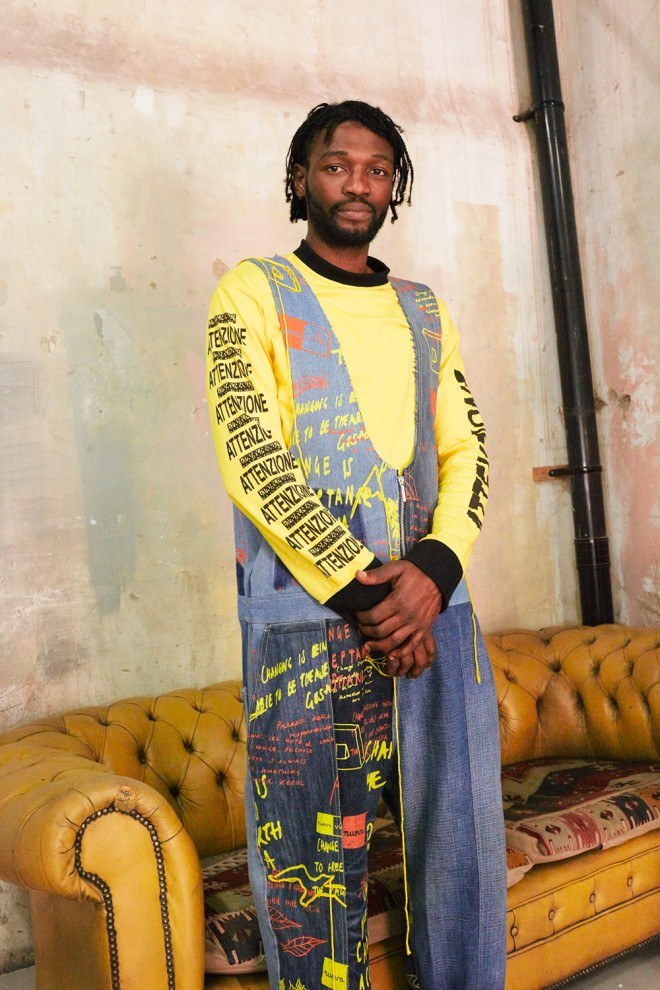
Through these social responsibilities that carry through the ethos of the brand, Bethany showcased a range that was less collection and more collective: shaped by the communities and charities involved, culminating in a selection of looks that tied together as a diverse multimedia display.
The presentation held an atmosphere of steadfast serenity, the models standing straight and majestic under a strong and direct spotlight in their ensembles, allowing for the audience to inspect the techniques and the fabric. The music emanating from the film was disarmingly enveloping: you were welcomed into the space, relaxing your senses in order to explore the film presenting life in San Patrignano and the resulting work they have created with the Making For Change community, Chris Carney Collections (a recycling facility where Bethany’s raw materials are sourced) and cottage industry hand knitters on the Isle of Man.
Bethany’s clothes are more than clothes – they are supportive measures, they are projects in itself. The garment design is led by sociological injunction and followed up with design rationale: recycled fabrics and the focal charities leading the shape, texture and function.

Speaking of her design process, Bethany notes: It always starts with the charity or community that I am working with, then it goes to the waste materials that I want to use, then it goes to the fabric and then from the fabric I work out the form: it is initially inspired by the charity I choose to work with from the start.
Bethany chooses to show one collection a year, due to the prolonged process involved in each collection, the level of external organisation and support expected, and the bespoke nature of the garments. Presenting around the London Fashion Week Men’s dates allows her to capitalise on audience, and frees up the year to focus on projects with various partners and institutions.
Sustainability is steadily growing as one of the key issues the fashion industry is choosing to address. Being a consultant and lecturer alongside her brand, Bethany has seen the approach others are taking: “I think sustainability has become such a big concern at the minute. I consult for bigger brands as well as doing my own projects, and companies are thinking about it, and thinking about the future. I work with Kering and they have their sustainability department and its massive. All kering brands also need to have a sustainability manager at your brand. They are looking at processes for luxury across the entire supply chain: people are really looking at it and thinking about the future.”
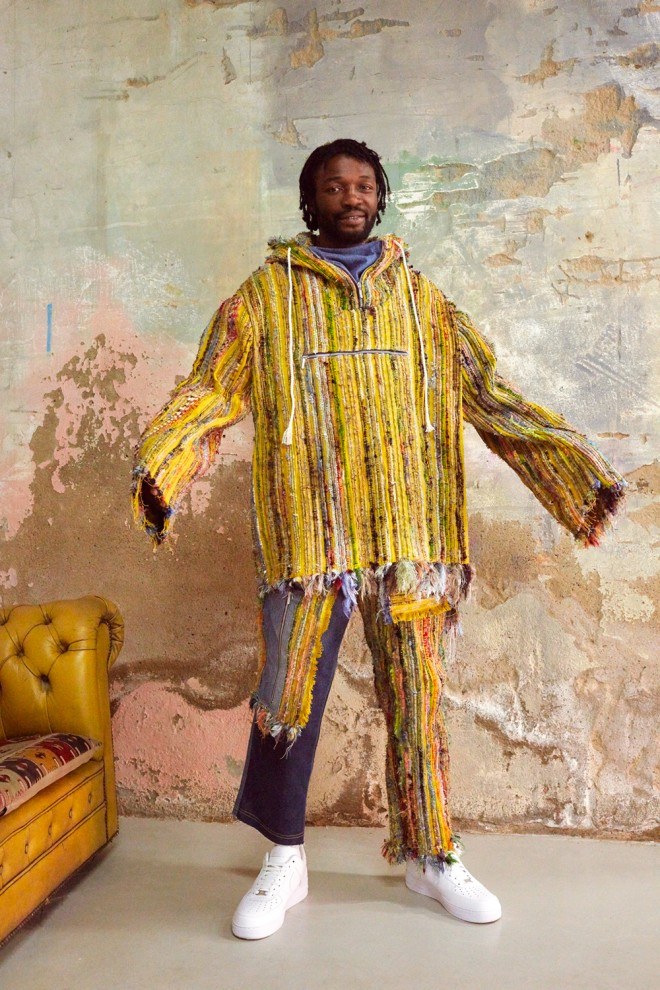
There are things that can make the heart beat faster – we all have our own hit list – but for London Fashion Week Men’s what will be a focus moving forward is the celebration of brands that are looking at the picture that far exceeds the fashion frame: brands where integrity and social responsibility is one of their first salutations.
And what would Bethany like her brand to stand for? Through her delightfully positive, softly spoken lilt “creating a solution through innovation”.
A toast to that for the brand that’s in it.
Tags: Bethany Williams, Bethany Williams AW18, Bethany Williams AW18 review, London fashion week mens, Menswear
07.01.2018 | Blog , Fashion | BY: admin
A pioneer of sustainable fashion, Bethany Williams puts a social conscience at the heart of her work; the last collection ‘Breadline’, worked alongside the Vauxhall food bank and Tesco to highlight the poverty crisis hidden in plain sight in the UK. Here the collection was developed around food waste, and Tesco recycled cardboard. The results were not only socially aware and environmentally friendly, but also innovative, avant-garde and sculptural – a hybrid of responsible and covetable which is glaring absent for the most part in the British fashion industry.
Her latest collection ‘Women of Change’ put women’s rehabilitation at the heart of her collection. The designer worked with female prisoners and the San Patrignano drug dependancy program, subverting the gender narrative to bring men into fore of the solution through her designs. Each piece was created from 100% organic or recycled, even down to the buttons which are handmade in the Lake District by Jean Wildish, who plants her own trees for the production of wooden buttons, and handmade in the UK and Italy.
The collection was shown at London Fashion Week Mens through a film, directed by Crack Stevens, along with a live presentation with models from TIH – a new modelling agency that supports young Londoners affected by homelessness.
One of the most exciting designers on the London menswear scene, Bethany Williams is offering a vision for the future which fashion desperately needs. We can’t wait to see what comes next.
Tags: Bethany Williams, Fashion, SS18, Sustainable fashion
















 Twitter
Twitter
 Tumblr
Tumblr
 YouTube
YouTube
 Facebook
Facebook
 Instagram
Instagram
